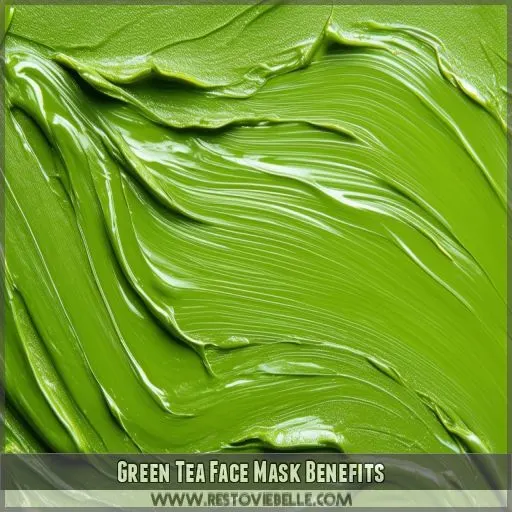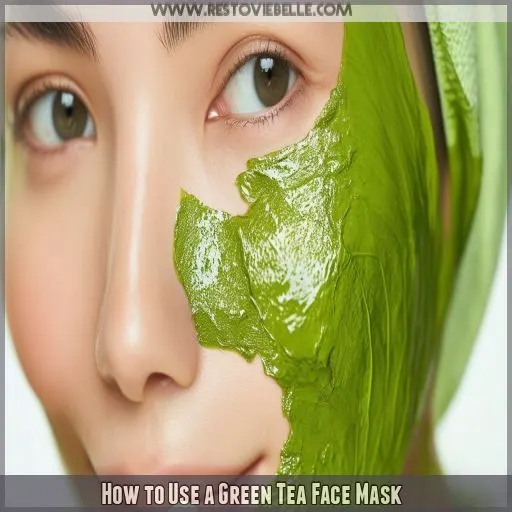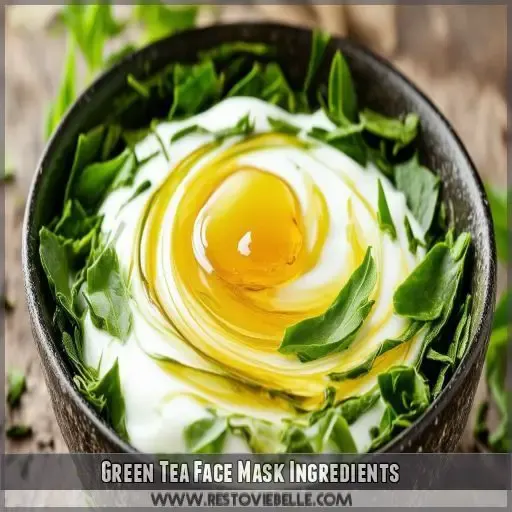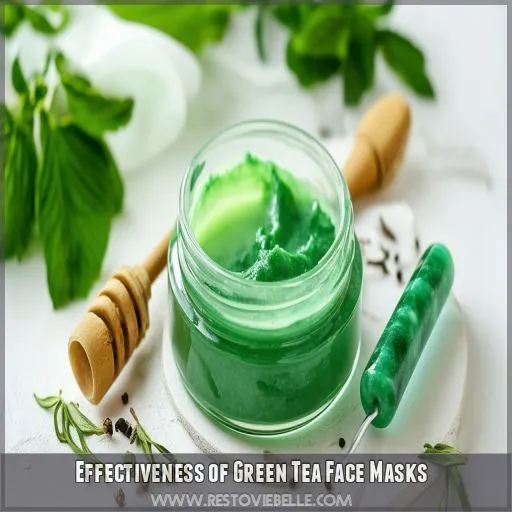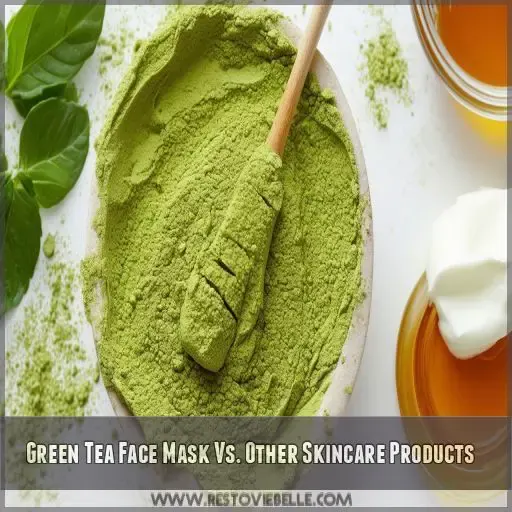This site is supported by our readers. We may earn a commission, at no cost to you, if you purchase through links.
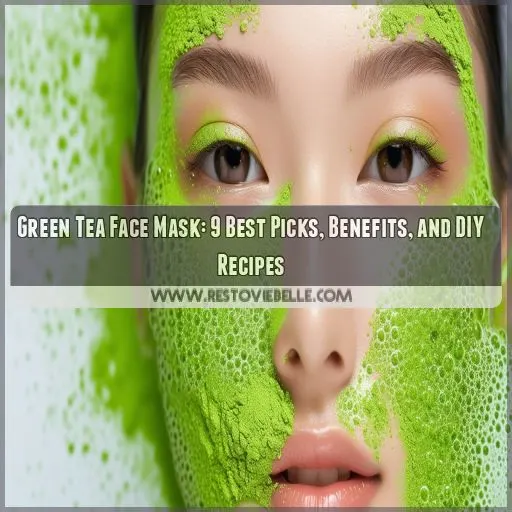 Prepare to delve into the realm of green tea face masks.
Prepare to delve into the realm of green tea face masks.
Green tea has been used for centuries in various parts of the world, renowned for its medicinal properties, enhancing cognitive function, and promoting weight management.
Now, it’s time to uncover its benefits for skincare.
Boasting antioxidant and anti-inflammatory properties, as well as efficacy in combating acne, green tea is an exceptional ingredient for promoting healthy skin.
This article will explore the scientific basis behind green tea face masks, offer DIY recipes, and showcase the finest products on the market.
Table Of Contents
- Key Takeaways
- Green Tea Face Mask Benefits
- How to Use a Green Tea Face Mask
- Green Tea Face Mask Ingredients
- Effectiveness of Green Tea Face Masks
- Green Tea Face Mask Vs. Other Skincare Products
- Frequently Asked Questions (FAQs)
- Does green tea face mask really work?
- Is green tea good for a face mask?
- Does green tea remove blackheads?
- Is it OK to put green tea on your face?
- How often should I use a green tea face mask?
- How long should I leave the mask on for?
- Are green tea face masks safe for pregnancy?
- Can I use a green tea face mask if I have sensitive skin?
- Do green tea face masks help acne?
- Conclusion
Key Takeaways
- Green Tea Face Masks: Nature’s Elixir for Radiant, Healthy Skin.
- Say Goodbye to Acne, Wrinkles, and Dullness with This Skincare Superhero.
- DIY or Store-Bought, Green Tea Face Masks are a Budget-Friendly Way to Pamper Your Skin.
- Embrace the Power of Green Tea for a Refreshed, Revitalized Complexion.
Green Tea Face Mask Benefits
Using a green tea face mask provides numerous benefits, including antioxidant and anti-aging effects, anti-inflammatory and soothing properties, anti-acne benefits, and moisturizing and nourishing effects. These masks protect against free radicals, reduce irritation, and control oil, making your skin smoother and healthier.
Antioxidant and Anti-Aging Benefits
Green tea face masks offer a range of benefits, especially in the area of anti-aging and antioxidant properties. Here are some key advantages:
- Antioxidant Benefits: Green tea is packed with antioxidants, fighting free radicals that can cause skin issues.
- Cell Rejuvenation: Rejuvenates dying skin cells, giving a youthful appearance.
- Collagen Maintenance: Encourages collagen promotion, maintaining skin firmness.
- Vitamins C and B: Energize tired skin cells, boosting moisture and leaving skin smoother.
Anti-Inflammatory and Soothing Properties
Green tea is a skin-soothing superhero, reducing irritation, calming redness and swelling, and offering relief for dermatological conditions like psoriasis, dermatitis, and rosacea. Its hypoallergenic properties make it a gentle, yet powerful, addition to your skincare routine.
Anti-Acne Benefits
- Bacteria reduction: Green tea’s antimicrobial and anti-inflammatory properties help fight and control the bacterial growth that causes acne.
- Oil secretion control: Polyphenols in green tea reduce sebum secretion, helping to control oil production and giving you smoother skin.
- Vegan-friendly: Green tea face masks are often vegan, with no animal testing, so you can be confident in your skin care routine.
Moisturizing and Nourishing Effects
In addition to fighting acne, green tea face masks are deeply moisturising, nourishing, and hydrating for your skin. They’re exfoliating, relaxing, and brightening, making them perfect for sensitive skin.
Additional Benefits
Besides the benefits mentioned, green tea face masks offer protection against UV rays, thanks to the repairing power of EGCG on DNA damage. This makes it an effective defense against skin cancer. Moreover, green tea’s natural ingredients can clarify pores, making it ideal for pore-refining treatments.
How to Use a Green Tea Face Mask
To use a green tea face mask effectively, first cleanse your skin and apply the mask, leaving it on for the recommended duration. After removing the mask, gently pat your skin dry and follow up with your regular skincare routine to maximize the benefits.
Preparation and Application
The preparation and application of a green tea face mask depend on the specific product and its instructions.
Generally, the process involves the following steps:
Cleanse your skin.
Mix the mask with water or another liquid, if necessary.
Apply the mask to your face, carefully avoiding the eye and lip areas.
Note that masks can come in various forms, such as sheets, pastes, or gels, each with its own unique application method. Always refer to the product’s instructions for detailed guidance on preparation and usage specific to your mask.
Duration of Use
The duration and frequency of your green tea face mask usage depend on various factors, including your skin type, the type of mask, and the desired results. As a general guideline, leaving the mask on for 10-20 minutes is a safe bet, but always refer to the specific instructions provided with your chosen mask.
Aftercare and Skincare Routine
After removing your green tea face mask, there are a few additional steps to follow for the best possible results and healthy skin:
- Timing: Depending on the specific mask’s instructions, the application time is usually between 10 and 20 minutes.
- Post-Mask Hydration: After removing the mask, gently pat your skin to help any remaining essence absorb.
- Complementary Products: Use a lightweight moisturizer afterward to keep your skin hydrated and make the mask’s benefits last longer.
- Daily Skincare: Include green tea face masks in your weekly skincare routine, and change how often you use them based on how sensitive your skin is and how strong the mask is.
Green Tea Face Mask Ingredients
Understanding the key ingredients in green tea face masks and their benefits helps you make informed choices for your skincare routine. Be mindful of potential allergens and the difference between natural and synthetic ingredients to guarantee the best results for your skin.
Key Ingredients and Their Benefits
Green tea face masks offer a range of benefits, thanks to their key ingredients. These ingredients work together to provide anti-aging effects, reduce acne, and soothe skin. Here’s a breakdown of some common key ingredients and their benefits:
| Ingredient | Benefit | Key |
|---|---|---|
| Green Tea Extract | Anti-aging, Anti-inflammatory, Acne reduction | Powerful antioxidant |
| Bamboo Extract | Skin soothing and calming | Natural anti-irritant |
| Centella Asiatica (Cica) Extract | Promotes collagen, deep hydration | Supports skin renewal |
| Collagen | Reduces fine lines and wrinkles | Essential for skin structure |
Allergen Cautions
While green tea face masks offer a multitude of benefits, it’s imperative to exercise caution, especially if you have sensitive skin. Here are some key considerations regarding allergen sensitivities and product safety:
- Patch Testing: Always perform a patch test before applying any new product to your face. This involves applying a small amount of the mask to a discreet area of your skin, such as behind your ear or on your inner arm, and waiting 24 hours to make certain no adverse reactions occur.
- Irritant Reactions: Some individuals may experience irritant reactions to certain ingredients in green tea face masks, such as redness, itching, or burning. If this occurs, discontinue use immediately and consult a dermatologist if symptoms persist.
- Skin Conditions: If you have pre-existing skin conditions, consult a dermatologist before using a green tea face mask to make sure it won’t exacerbate your condition.
- Product Safety: Only purchase green tea face masks from reputable sources that provide a detailed list of ingredients. Avoid products with unknown or questionable ingredients, and always follow the manufacturer’s instructions for use and storage.
Natural Vs. Synthetic Ingredients
When it comes to skincare products, evaluating the origin of their ingredients is crucial.
Ethical sourcing and sustainability are fundamental to ensuring the quality and safety of these products.
Natural ingredients, derived from plants and minerals, offer a gentle and effective approach to skincare.
On the other hand, synthetic ingredients may introduce chemical additives and potential environmental impacts.
Ingredient transparency is imperative so that you are fully informed about what you are applying to your skin.
Effectiveness of Green Tea Face Masks
When evaluating the efficacy of green tea face masks, clinical research emphasizes their advantages, such as antioxidant and anti-inflammatory properties. User accounts frequently support these observations, but it’s essential to be mindful of possible adverse effects or allergic reactions.
Clinical Studies and Research
Green tea face masks have become increasingly popular in dermatology, and they are now commonly incorporated into skincare routines.
The manufacturing process infuses natural extracts and antioxidants derived from green tea leaves, harnessing their benefits for the skin.
Global market trends reflect a growing consumer demand for these masks, driven by a preference for natural, eco-friendly, and sustainable skincare products.
Furthermore, clinical studies and research support the long-term efficacy of green tea face masks, which we will discuss in more detail in the following section.
User Testimonials
User testimonials further highlight the effectiveness of green tea face masks. Those with sensitive skin praise its soothing and calming properties, with one user claiming it left their skin feeling "supple and smooth." DIY variations and home remedies are also popular, with many sharing their positive experiences online.
Potential Side Effects or Reactions
While green tea face masks offer a plethora of benefits, they may cause skin irritation or allergic reactions in some individuals. If you have sensitive skin, it’s important to perform a patch test before applying the mask to your entire face. Consult a dermatologist if you have any concerns or experience adverse reactions.
Green Tea Face Mask Vs. Other Skincare Products
When comparing green tea face masks to other skincare products, you’ll notice that their antioxidant and anti-inflammatory properties often surpass those of traditional creams or serums, making them particularly effective for combating various skin issues. Plus, they’re usually more affordable and often come in eco-friendly packaging, adding both financial and environmental value to your skincare routine.
Comparing Benefits and Results
When comparing green tea face masks to other skincare products, it’s crucial to assess the benefits of DIY recipes and homemade options. Organic ingredients and customizable masks allow you to tailor treatments to your specific skin needs, ensuring cost-effectiveness and maximum results.
Price and Value
Price is an important consideration when choosing skincare products.
Green tea face masks offer a range of options, from budget-friendly to luxurious.
Ampoule masks are available for as little as $1.90, while premium sheet masks can cost up to $25 for a single use.
For those looking for a more cost-effective option, a 10-pack of sheet masks offers better value, especially with special offers.
Sustainability and Eco-Friendly Packaging
When considering the sustainability and eco-friendliness of green tea face masks, it’s important to look beyond the product itself and pay attention to the packaging and materials used.
Many face masks, including green tea varieties, are packaged in single-use plastic sachets. These contribute to waste and harm the environment.
To make a more sustainable choice, look for masks with compostable or biodegradable packaging. Alternatively, opt for reusable options, such as glass jars or recyclable containers, which reduce waste and lessen the environmental impact of your skincare routine.
Frequently Asked Questions (FAQs)
Does green tea face mask really work?
Green tea is rich in antioxidants and is known to have anti-ageing properties. It can help reduce puffy eyes, dark circles, and the signs of ageing. It can also promote cell regeneration and protect against certain types of cancer. So, yes, green tea face masks can work wonders for your skin.
Is green tea good for a face mask?
Yes, green tea is a great ingredient for a face mask. It’s gentle and safe for all skin types, offering benefits like reduced inflammation, hydration, and fighting free radicals.
Does green tea remove blackheads?
It’s not a magic wand, but green tea can be a powerful tool in your skincare arsenal. It won’t snap blackheads away instantly, but it can help remove excess oil and reduce sebum production, making it easier to keep those pores clear and blackhead-free.
Is it OK to put green tea on your face?
Yes, it’s OK to put green tea on your face. It can reduce redness, brighten your complexion, and help treat acne. However, make sure to test the tea on a small area of skin first to check for allergies.
How often should I use a green tea face mask?
For ideal results, use a green tea face mask once or twice a week. Excessive use may lead to irritation and dryness, so it’s important to find the right balance for your skin.
How long should I leave the mask on for?
Generally, you should leave a face mask on for 10 to 20 minutes. However, always refer to the specific instructions provided with your face mask, as different products may have varying recommended durations.
Are green tea face masks safe for pregnancy?
As your skin changes during pregnancy, you may wonder if green tea face masks are safe. Fortunately, they are! Green tea can even help clear up hormonal acne during pregnancy. Matcha face masks are also safe to use, and there are recipes for both oily and combination skin types.
Can I use a green tea face mask if I have sensitive skin?
Yes, green tea face masks can be used on sensitive skin. However, it’s important to test a small patch of skin first to check for any signs of sensitivity or allergic reaction, such as itchiness, redness, swelling, or burning. If you have any concerns, consult your dermatologist.
Do green tea face masks help acne?
Green tea is a powerful ally in the battle against acne. Its anti-inflammatory properties help reduce breakouts, while polyphenols reduce sebum secretion, improving complexion and unclogging pores. A topical 2% green tea lotion was found effective against mild to moderate acne.
Conclusion
Some may argue that green tea is best enjoyed as a beverage, but its benefits extend well beyond that.
We’ve explored the remarkable advantages of green tea face masks, from their antioxidant prowess to their acne-fighting abilities. The scientific backing, DIY recipes, and market offerings were also discussed, providing a thorough understanding of this skincare trend.
The benefits of green tea face masks are evident, offering a natural, effective, and soothing approach to skincare. With their anti-inflammatory, anti-aging, and moisturizing properties, these masks are an invigorating addition to any skincare routine, enhancing your complexion and overall skin health.
So, go ahead and give them a try. Whether you opt for a DIY recipe or a store-bought option, green tea face masks are a worthwhile addition to your self-care regimen.

